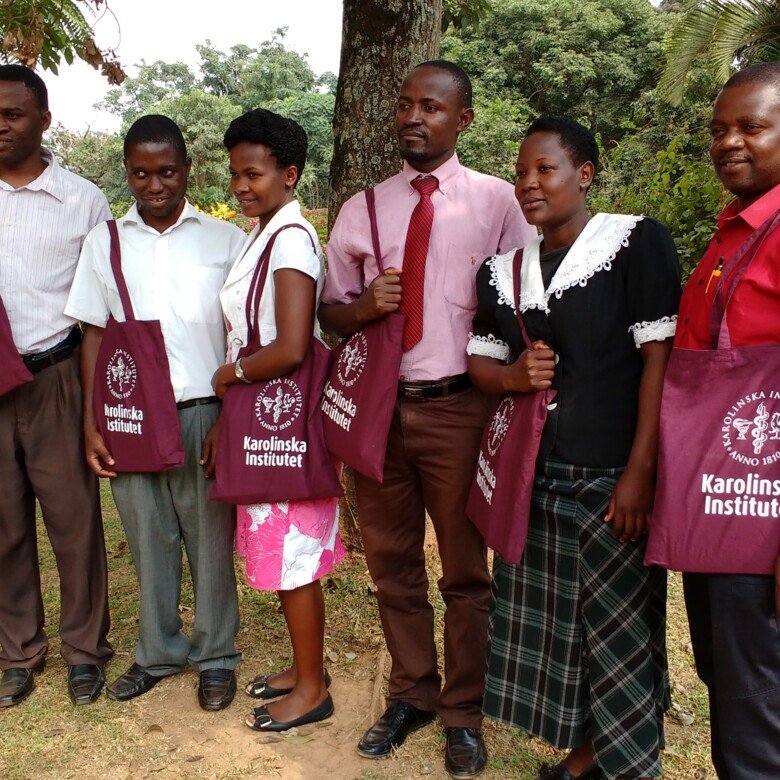Participation in everyday life - A randomized controlled trial of a mobile phone-supported and family-centered rehabilitation intervention after stroke in Uganda
This research project aims to develop knowledge about, implement and evaluate a model for mobile phone-based family-centered rehabilitation after stroke.

The goal of the mobile phone-supported and family-centered rehabilitation intervention F@ ce 2.0 is to enable daily activities and support participation in everyday life for people who have had a stroke and their families. The rapid development of information and communication technologies (ICT) and the integration of mobile phones into the everyday lives of people in Uganda create opportunities for new initiatives in health care.
The research program is conducted in different cultures (Sweden and Uganda) with different traditions of using the technology and in different groups of people who have had a stroke.
Design
To study the effects of the family-centered intervention F @ ce 2.0, a randomized controlled study is conducted where the intervention group receives F @ ce 2.0 and the control group receives the usual rehabilitation. Participants will be recruited from health care / rehabilitation units in the Kampala area and from an area in the countryside, around Masaka. Qualitative interviews about experiences of the rehabilitation and about how the implementation of F @ ce 2.0 worked will be conducted with people who have had stroke, family members and staff in health care and rehabilitation.
Funding
Swedish Research Council (Development research)
Principal Investigator
Susanne Guidetti
Professor/Occupational TherapistOther researchers
Gunilla Eriksson, Uno Fors, Lena von Koch, Charlotte Ytterberg, Julius Kamwesiga.
References
- Kamwesiga JT, Tham K, Guidetti S. Experiences of using mobile phones in everyday life among persons with stroke and their families in Uganda - a qualitative study. Disabil Rehabil 2017; 39 (5):438–49.
- Kamwesiga J, von Koch L, Kottorp A, Guidetti S. Cultural adaptation and validation of Stroke Impact Scale 3.0 version in Uganda: A small-scale study. SAGE Open Medicine. 2016; 4:1-10.
- Kamwesiga, J.T., von Koch,LK., Eriksson, G.M. & Guidetti, S.G.E. The impact of stroke on people living in central Uganda: A descriptive study. African Journal of Disability, 2018, 7(0),a438.
- Kamwesiga T J, Eriksson G, Tham K, Fors U, Ndiwalana A, von Koch L, Guidetti S. A feasibility study of a mobile phone supported family-centred ADL intervention, F@ ce™, after stroke in Uganda. Globalization and Health. 2018; 14:82.
- Guidetti S, Utbult M, Kamwesiga JT, Eriksson G. Perceived occupational gaps among Ugandan general population - a pilot study. South African Journal of Occupational Therapy. 2019; 49 (3): 17–23.
- Fors U, Kamwesiga J, Eriksson G, von Koch L, Guidetti S. The use of a novel SMS-based reminder system for supporting post-stroke patient rehabilitation. BMC Medical Informatics and Decision Making. 2019; 19:122.
- Teriö M, Eriksson G, Kamwesiga JT, Guidetti S. What’s in it for me? A process evaluation of the implementation of a mobile phone-supported intervention after stroke in Uganda. BMC Public Health. 2019; 19:562.
- Guidetti S, Kamwesiga J, von Koch L, Eriksson G. The family members’ experiences of participating in a mobile phone supported family-centred intervention. In manuscript.
- Thesis: The perceived impact of stroke and feasibility of a mobile phone supported ADL intervention in Uganda. Author: Kamwesiga, Julius Tunga. Date: 2018-05-04
- Elmberg Sjöholm M, Eriksson G, Bii A, Asungu J, von Koch L, Guidetti S. Living with consequences of stroke and risk factors for unhealthy diet- experiences among stroke survivors and caregivers in Nairobi, Kenya. BMC Public Health. 2021 Mar 16;21(1):511. doi: 10.1186/s12889-021-10522-4. PMID: 33726725.
